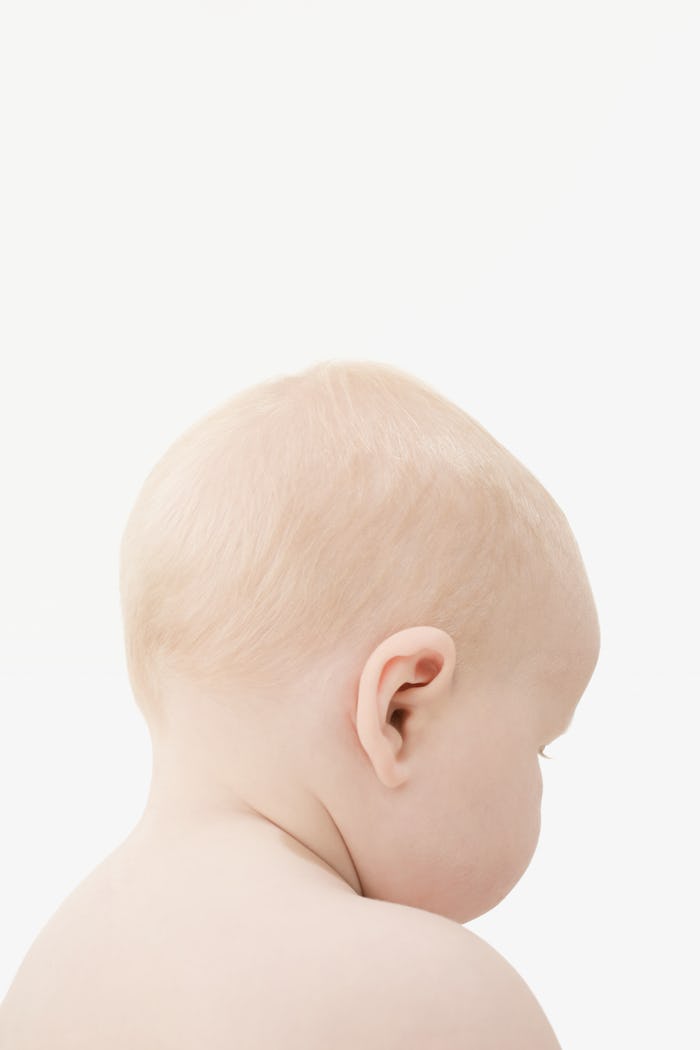Parenting

Can You Help Your Baby’s Hair Grow?
They won’t be bald forever.
You always wondered what your baby would look like before they were born. Will they inherit your grandmother’s green eyes, or your MIL’s nose? When your little one finally makes their debut, it’s exciting to see if those lush locks you dreamed of would be blonde or brown, curly or pin straight. That’s why no one was more surprised than you when your baby was born a baldie. And even though you love your little one’s sweet skull, you've started estimating when some hair (or sheesh, even some peach fuzz) will start to sprout. Wondering how to make baby hair grow? Read on.
Why are some babies born bald?
When you take a look around the hospital nursery and spot other newborns with a full head of hair... and then look at your own hairless wonder, it can make you question what the heck happened. The answer is: It’s hard to know. “In general, hair growth is due to many factors and can vary from baby to baby, so I tell parents not to compare,” Dr. Candice Jones, M.D., a board-certified pediatrician, tells Romper. “Some babies are born with a head full of hair and others are born bald.”
Although it’s not the only reason, babies who born at lower birth weights might also have less hair — if any at all, a PubMed study found. According to researchers, a baby’s weight at birth is strongly connected to their neonatal hair density.
How to make baby hair grow
You’re not looking for your baby to have Rapunzel-esque hair, but a few strands that you could put into a cute little clip couldn’t hurt. There is no tried and true way to grow hair, but there are some things to be aware of that might be impeding Baby’s hair growth.
Factors that contribute to baby hair growth
Diet
A healthy baby is a happy baby — and one that is more likely to have hair on their sweet little head. “A well balanced, healthy diet provides the body essential nutrients for many things, including hair growth,” says Jones. “Adequate hydration is also key, too.” So make sure that your baby feeds well, particularly in those first few weeks, and you just might start to feel something sprouting as you caress their head while nursing or drinking their bottle.
Genetics
Some babies are born with a full head of hair, while others barely seem to have a strand or two. If you ever wondered why, just take a look at some of your own baby or partner’s pics to gain some insight. Because when it comes to whether your child will have a lot of hair (or next to nothing) is often determined by genetics. “There are various factors that contribute to hair growth but genetics is likely the most influential,” says Jones. “How this happens is not fully understood, though.”
Scalp infection and cradle cap
“Hair conditions like fungal scalp infections or severe cradle cap can prevent growth,” says Jones. “Once these conditions are treated and resolve, your baby’s hair will grow.” But if your child’s scalp is healthy, Dr. Jones says that there isn’t a magical treatment to make hair grow.
Does brushing baby’s head stimulate hair growth?
The idea of stimulating hair growth by brushing your child’s head or giving a gentle massage sounds like a good idea — in theory. Except it’s not true. “Brushing the hair or massaging the scalp to grow hair is likely a myth,” explains Dr. Jones. “However, brushing hair as part of general hair care is important to distribute healthy hair products, to ease tangling which can lead to breakage, and gently flake away cradle cap if present.” Ghanima Abdullah, a hair expert and cosmetologist, agrees, stating: “Even a massage with oil could harm the development of the skull, which is still so soft and flexible.” Dr. Jones confirms that if done incorrectly (i.e. the massage is too vigorous), it could be unsafe for a newborn’s head.
At what point should parents be concerned?
For the most part, if your baby is born bald, there isn’t too much to worry about. In fact, your friend’s baby with hair to spare will probably begin losing theirs at some point, becoming patchy bald, too. “Most babies will lose hair in the first six months and start to regrow hair by twelve months,” says Dr. Jones. But there comes a point when you might have to worry if your baby is still bald. “If your baby is still bald at 2 years of age, discuss it with your pediatrician and/or see a dermatologist,” she says. Why? Because it can be a sign of hypotrichosis, (which is the loss of hair at a young age), alopecia, or even a scalp infection.
If your little one comes into the world as bald as, well, a baby’s butt, it’s most likely nothing to be concerned about. Eventually their head (which has 100,000 hair follicles) will start sprouting hair. And when you’re struggling to get a comb through your kiddo’s totally tangled mop as a cheeky toddler, you’ll miss the days when you could cradle your kiddo’s sweet (and bald) baby head.
Studies cited:
Neri, I., Piccolo, V., Cocchi, G., Starace, M., Patrizi, A., Dika, E., Piraccini, B. “Hair in newborns and infants: clinical and dermoscopic evaluation of 45 cases” 2013.
Martel, J., Miao, J., Badri, T. “Anatomy, Hair Follicle” 2021.
Peled, A., Samuelov, L., Sarig, O., Bochner, R., Malki, L., Pavlovsky, M., Pichinuk, E., Weil, M., Sprecher, E. “Treatment of hereditary hypotrichosis simplex of the scalp with topical gentamicin” 2020.
Sources interviewed:
Dr. Candice Jones, M.D., a board-certified pediatrician
Ghanima Abdullah, a hair expert and cosmetologist
This article was originally published on